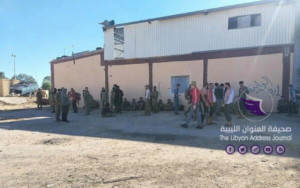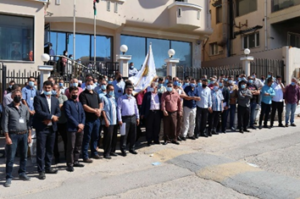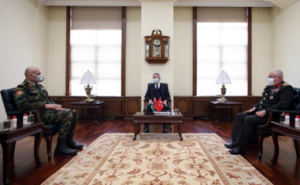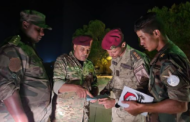On October 19, the House of Representatives rejected the resignation that the Tobruk-based Interim Government had submitted on September 13.
On October 20, Libyan Media Institute director Mohammed Baiyu was kidnapped by the GNA Tripoli-based militia “The Revolutionaries Brigade”, who accuse him of affiliation with the former regime and even with Haftar.
On October 23, the GNA and the LNA signed an agreement in Geneva for a long-lasting ceasefire in Libya. The accord was welcomed by most countries and international bodies, with the exception of Turkey.
Again on October 23, the National Oil Corporation (NOC) lifted force majeure on the oil facilities of Es Sider and Ras Lanuf.
On the international level, in a joint press conference with the Moroccan Foreign Minister Nasser Bourita on October 25, House of Representatives Speaker Aguila Saleh reiterated his support for the ceasefire agreement signed in Geneva.
ABU GRAIN – AL-WISHKA
- The Libyan army’s Operations Room of Sirte and Al-Jufra announced in a statement on October 20 the complete closure of the main and secondary roads south of the Abu Grain and Al-Wishka areas towards Al-Jufra, due to sporadic skirmishes between the Libyan army and Haftar’s forces.
BENGHAZI
- Tobruk-based House of Representatives (HoR) announced on October 22 that Aguila Saleh’s media advisor, Abdul Hamid al-Safi, came under armed attack allegedly by pro-Haftar gunmen on October 20 while he was in Benghazi;
- Operation EUNAVFOR MED Irini reported on October 21 that it had boarded and inspected on October 20 the Merchant Vessel (MV) MEDKON SINOP in application of the United Nation Security Council’s Resolution 2292 of 2016 concerning the arms embargo on Libya. Nothing suspicious was reported;
- on October 19, the House of Representatives rejected the resignation that the Tobruk-based Interim Government had submitted on September 13;
- on October 19, Benghazi saw security unrest and assaults on shops after militia leader Ashraf al-Faydi allegedly kidnapped a woman, raped her, and forced her to divorce her husband. Reportedly, the woman later denied having being raped.

ES SIDER – RAS LANUF PORTS
- on October 23, the National Oil Corporation (NOC) declared it had lifted force majeure on exports from the ports of Es Sider and Ras Lanuf, announcing the output would reach 800,000 BPD within two weeks and 1 million BPD in four weeks. In a statement, NOC said foreign forces had left the ports allowing it to recommence operations.
JAGHBOUB
- a young hunter from Tobruk has been killed in an airstrike operated by the Egyptian air force after crossing the border with Egytp near Jaghbub, in the southeast of Libya, the local Bayda media outlet confirmed on October 19.
MISRATA
- Muslim Brotherhood members from Misrata resigned from the group and dissolved the group’s bureau in the city on October 22, declaredly to avoid being the pretext of any agenda aiming to end freedoms and prevent the completion of the revolutionary project and goals.
TOBRUK
- on October 25, IRINI announced its forces had stopped and searched a Syrian commercial cargo ship, named “Capt Abeda”, on its way to Misrata. The ship had sailed from Akdeniz in southeastern Turkey on October 21. No irregularities were detected.

TRIPOLI
- on October 21, Syrian opposition social media platforms, loyal to Turkey, published photos of a revolt in the Souk al-Khamis military camp, south of Tripoli, organized by some 100 Syrian mercenaries of the Al-Mu’tasim Division accusing their commander, known as “Abu al-Abbas al-Marai”, of having stolen their salary;

- on October 20, Libyan Media Institute director Mohammed Baiyu was kidnapped by the Tripoli Revolutionaries Brigade, a Tripoli-based militia recognized by the Libyan government. Baiyu is accused of strong affiliation with the former regime and possibly even close to Haftar;

- on October 19, employees of Libya’s National Anti-Corruption Commission (NACC) held a demonstration in front of their headquarters in Tripoli protesting the arrest of their head, Noaman al-Sheikh, by orders of the Military Prosecutor.

INTERNATIONAL RELATIONS
- In a joint press conference with the Moroccan Foreign Minister Nasser Bourita on October 25, House of Representatives Speaker Aguila Saleh reiterated his support for the ceasefire agreement signed in Geneva;
- on October 24, the Chairperson of the African Union Commission, Moussa Faki reiterated the African Union’s readiness to assist in the implementation of the ceasefire and to contribute to create the necessary conditions for the resumption of dialogue between all Libyan stakeholders for a durable solution;
- the Spokesman of the Libyan National Army (LNA), Ahmed al-Mismari, said on October 24 that LNA is “fully committed to the Geneva Agreement,” noting that “the parties involved in the Geneva Agreement have understood there is no discussion about the supreme interests of the Libya”;
- on October 24, in open defiance of the distension and the low-profile approach encouraged by the Geneva Agreement, the Turkish Ministry of Defense tweeted pictures of GNA militias being trained by the Turkish military. The Ministry later confirmed the news with an official statement;
- GCC Secretary-General Nayef al-Hajraf welcomed the signing of a permanent ceasefire agreement in Libya. According to the Emirati newspaper Al-Bayan, Al-Hajraf expressed his hope that “this agreement leads to a comprehensive political solution for security and stability for the brotherly Libyan people”;
- on October 23, Turkish President Erdoğan said the ceasefire agreed upon in Geneva “does not seem too achievable”, unlike the United States, Britain, Italy, the EU, and Egypt, which had unanimously welcomed the agreement;
- Russian Foreign Ministry spokeswoman, Maria Zakharova said in an official statement that Moscow considers the ceasefire agreement an important step on the roadway to overcoming the severe crisis in Libya and the start of an in-depth political dialogue”;
- United Nations Secretary-General António Guterres said that the Libyan ceasefire agreement of October 23 was a “fundamental step toward peace and stability” in the country and that there was much hard work ahead;
- the Commander of the Joint Force in the Western Region, Brig. Gen. Fitori Gribel, said all of Haftar’s heavy weapons and mercenaries are going to start evacuating Sirte and Al-Jufra by the end of this week or next week. In the meanwhile, however, Haftar’s representative to the 5+5 Joint Military Commission talks in Geneva, Khairi Tamimi, released a contradictory statement that Sirte and Jufra will not be demilitarized, but will form a joint force to protect the two cities;
- the UN Acting Envoy to Libya, Stephanie Williams has revealed the main points of the ceasefire agreement that was signed on October 23 by the Libyan warring parties. After five days of talks, negotiators from the Tripoli-based Government of National Accord (GNA) and the Libyan National Army (LNA) signed the ceasefire agreement to put an end to the hostilities;
- on October 23, Tunisian PM Michichi granted permission to reopen the Ras Jedir border crossing with Libya after agreeing with Libya upon resuming trade exchange and movement of people between the two countries;
- the UN-sponsored Libyan Political Dialogue Forum (LPDF) will be held in Tunisia on November 9, the Tunisian Foreign Ministry announced on October 22. The announcement came, in a statement, about the 5 + 5 ministerial meeting of Western Mediterranean countries, which Tunisia hosted on October 22;
- on October 22, Italian foreign minister Di Maio reiterated the importance of “cohesive support for stabilization in Libya along the lines indicated by the UN and during the Berlin Process”;
- on October 22, United States ambassador to Libya, Richard Norland said there is no doubt the Wagner Group is operating on behalf of the Russian government, and that the presence of any armed groups in Libya will only lead to undermining trust between the parties;
- During a meeting on October 22 in Rome, Presidential Council Head, Fayez al-Sarraj and Italy’s Prime Minister, Giuseppe Conte stressed that the political solution to the Libyan crisis is based on the outcomes of the Berlin Conference and through three key issues: security, economy, and politics;

- on October 21, Libya’s Interior Minister, Fathi Bashagha and Italy’s Foreign Minister, Luigi Di Maio discussed in Rome cooperation in several fields, especially security. Bashagha also met with the Italian Interior Minister, Ms Luciana Lamorgese and discussed forming a joint anti-illegal-immigration room;
- on October 21, US Secretary of State, Mike Pompeo praised the Libyans’ efforts to reach a ceasefire, insisted on the withdrawal of all foreign forces so as to allow the Libyans to decide their own future;
- Italy and France have both welcomed the resumption of the Libyan Joint Military Committee (JMC) (5 + 5) talks in Geneva, with the participation of the Acting Head of the United Nations Support Mission in Libya (UNSMIL), Stephanie Williams;
- on October 20, the Turkish Defense Ministry said it had started training Libyan Coastguard personnel as part of the MoU between Turkey and Libya, and will continue offering training programs and courses to the Libyan military personnel as part of the agreements of cooperation with the Libyan Government of National Accord;

- on October 19, Turkey’s Defense Minister Hulusi Akar received the Libyan Chief of Staff, Mohammad al-Haddad in Ankara, underlining that Ankara will continue to support the Libyan people. Akar also congratulated Al-Haddad for his recent appointment;

- the EU foreign policy chief, Josep Borrell, expressed satisfaction at the resumption of the 5 + 5 Joint Military Committee in Geneva under the auspices of the United Nations. The EU top diplomat expressed hope that the Libyan military leaders from both sides will seize the opportunity to transform a de facto truce into a credible, permanent, and sustainable ceasefire;
- on October 19, the fourth round of the Libyan (5+5) Joint Military Commission (JMC) talks began in Geneva with the participation of UNSMIL Acting head Stephanie Williams. The deliberations of this round will continue until October 24;
- the United States lauded Morocco’s unceasing support to the UN’s intervention in Libya, Assistant Secretary of State for Near Eastern Affairs David Schenker said in Rabat on October 19.


























